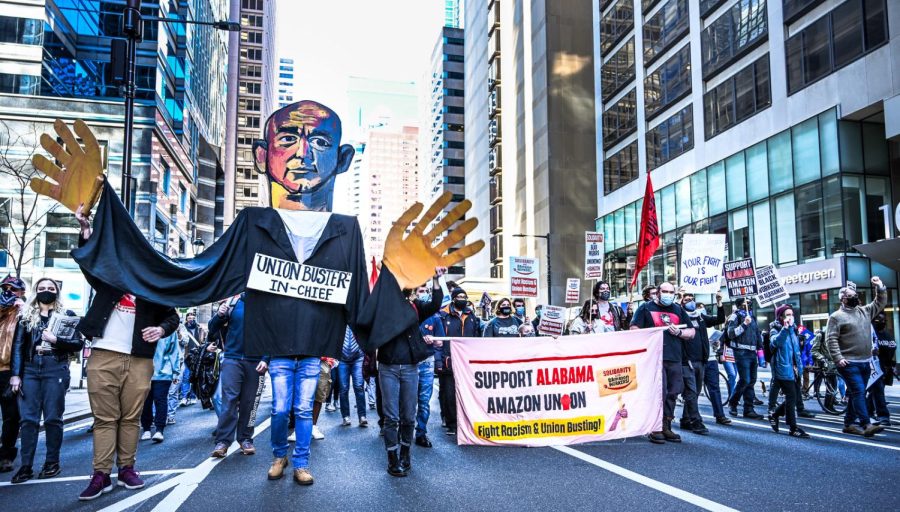Opinion | Amazon Labor Union offers key lesson for labor
Photo courtesy of Joe Piette/Flickr
Protestors take to the streets of Philadelphia to support the Alabama Amazon Union. Senior Columnist Eddie Ryan writes about Amazon’s actions toward the suppression of unionization within its workforce.
Apr 25, 2022
Coverage of noteworthy events, particularly when those events are aberrant or even mold-breaking, is usually laced with cliches. How often have we all heard a movement lauded as “grassroots,” or some triumph as a “Cinderella story”?
This fact makes those times when the cliches ring true that much sweeter. Such is the case with the recent unionization of an Amazon warehouse in Staten Island, which established the Amazon Labor Union, the first in American history.
Of greatest importance is the true grassroots character of the workers’ campaign. In contrast to other unionization efforts, including an ongoing battle in Bessemer, Alabama, to form another Amazon union. Workers at the J.F.K.8 warehouse declined to enlist the support of established unions.
This achievement belongs to these workers, local people who, long-suffering under inhumane and oppressive labor conditions, caught a glimpse of the power of organizing and pursued it.
Christian Smalls, founder of the Amazon Labor Union, gave the campaign its initial propelling thrust. After inquiring about the warehouse’s lack of COVID-19 safety precautions early in the pandemic, Smalls — a worker who had not tested positive for the virus — was dubiously placed in quarantine by Amazon. After breaking quarantine to lead demonstrations outside the warehouse calling for adequate COVID-19 protections, Smalls was promptly fired.
Get The Daily Illini in your inbox!
This spurred Smalls and Derrick Palmer, another J.F.K.8 worker, to launch a bold unionization drive in pursuit of better pay, benefits and safety for workers.
This win reaffirmed what many already knew — that Amazon abuses its workers and that those workers have the right to unionize. What’s more, the Amazon Labor Union succeeded by returning to the fundamentals of labor organizing.
The strength of American labor unions has dropped precipitously since the mid-20th century, and Amazon has done its best to bludgeon organized labor even deeper into decline since the company was founded. A routinely deployed array of union-busting tactics has insulated Amazon from labor’s demands for over twenty years.
These tactics include: giving out anti-union materials for managers to disseminate, launching propaganda campaigns in which unions are wrongly labeled “third parties” and holding “captive audience” meetings where workers are made to listen to anti-union lectures from management. This is not to mention outright illegal actions like hiring Pinkerton agents — the violent strike-busting henchmen of America’s robber-baron era — to surveil workers trying to unionize.
Amazon largely relied on its standard playbook during the J.F.K.8 campaign. Nevertheless, the workers deftly thwarted the company’s efforts to defame and deny them.
Management sold workers lies about the union’s intentions and miscast it as a “third party” rather than a representative body made up of the workers themselves. They plastered warehouse walls with signs reading “Your voice. Your vote. Vote no” before the unionization vote — a move described as “childish” by one employee. Management also ran numerous captive audience meetings at J.F.K.8.
Racism pervaded Amazon’s suppression of the union as well. The company apparently thought it could kill the movement by publicizing Smalls’ role in it. One executive called him “not smart or articulate” and said that Amazon should try to make him the face of the budding union. Smalls, who is Black, embraced the idea and led the organizing effort with admirable charisma and savvy.
It shouldn’t come as a surprise when Amazon’s tactics start looking dystopian, either. Citing the supposed risks of allowing “free text” on an internal messaging app for workers — namely, that workers might foster a “negative associate experience” with their complaints — the company created an “auto bad word monitor.”
If implemented, this feature would censor anyone who attempted to write a word or phrase included in the list of banned speech. Those who study the list might discover with amusement that it inadvertently censors a lot of speech Amazon presumably favors — “I hate unions,” for instance — an irony likely lost on execs.
In response, the ALU got creative. Organizers talked to workers at the bus stop in the morning, informing them of the union’s goals. They had a counter presence at every captive audience session, making their side of the debate known and even dialing back on boisterous disruptive tactics when they sensed this approach rubbed workers the wrong way.
Most importantly, the ALU ran a transparent, human-centered operation. These workers committed to the gritty work of educating one another and building solidarity, and did so without establishment resources. Therein lies the revolutionary potential of this victory, perhaps the germ of a resurgence for American labor.
Corporate executives and labor leaders alike are debating the implications of the ALU’s win. It is, after all, a veritable “Cinderella story.” J.F.K.8’s success could prove difficult to replicate, and Amazon unions in general face a different set of challenges than workers at companies like Starbucks, where it’s a matter of unionizing a cafe rather than a large warehouse of employees.
Regardless of these uncertainties, the ALU served us all an important reminder: return to the fundamentals of organizing, and do so with compassion and creativity. Their approach should inspire all activists fighting for workers’ rights today.
Eddie is a junior in LAS.






